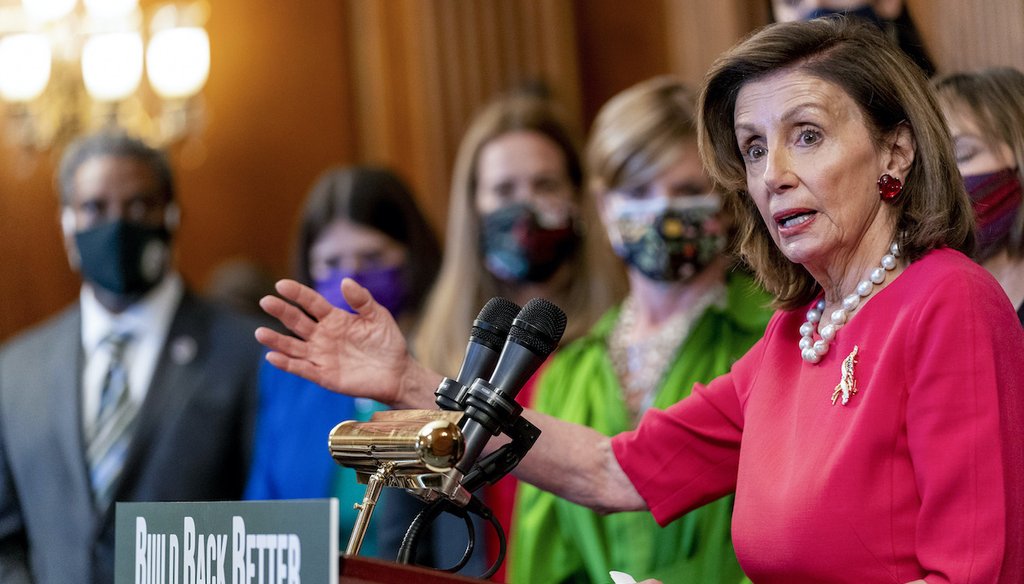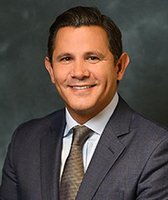Get PolitiFact in your inbox.

House Speaker Nancy Pelosi of Calif., accompanied by other House Democrats and climate activists, pauses while speaking about their "Build Back Better on Climate" plan on Capitol Hill in Washington, Tuesday, Sept. 28, 2021. (AP)
If Your Time is short
-
The Democrats’ reconciliation bill is in flux, with no firm numbers on spending or offsetting revenues. Some Democrats want a spending amount lower than the earlier $3.5 trillion proposal.
-
A House memo outlined tax increases, but they were largely for wealthy individuals and corporations. These tax increases are not final since the legislation is still being negotiated.
A GOP political group aligned with Republican leader Sen. Mitch McConnell has launched ads attacking Democrats in battleground states over their party’s social spending bill.
The ads by the One Nation group try to link Sens. Mark Kelly of Arizona, Catherine Cortez Masto of Nevada and Maggie Hassan of New Hampshire to the "liberal spending spree" being crafted by Democrats, spending $10 million on a package of TV, radio and online ads. One Nation is a dark money nonprofit aligned with the Senate Leadership Fund, a PAC controlled by McConnell.
"Speaker Pelosi and Sen. Cortez Masto are pushing a multi-trillion dollar spending spree after spending trillions already," the narrator says. "It’ll cost you, with the largest tax increase in decades crushing small businesses and making families pay more."
The quote about the "largest tax increase in decades" comes from a Sept. 13 headline in Fortune. But unlike the Fortune article, the ad doesn’t explain who would largely get hit by those tax increases. And it omits that since the proposal is in flux, we don’t yet know the final price tag or amount of tax increases.
Democrats proposed a $3.5 trillion reconciliation bill, often called the Build Back Better Act. The legislation was designed to address a number of Democratic priorities, including universal preschool for 3- and 4-year-olds, a national paid family and medical leave program and investments to address climate change. Pelosi set a goal to pass the bill, along with the infrastructure spending bill, by Halloween, though it could take longer.
"Not only is it in flux, but it has been whittled down" since the Fortune article in September, said Steve Ellis, president of Taxpayers for Common Sense. "It is clear that the Senate — if they can agree on anything — won’t agree to something this large. I would also point out that the increase in revenue is to offset a similar amount of spending, so it isn’t just about generating revenue for deficit or debt reduction. So the ad isn’t telling the full picture."
The Democrats’ proposal follows the 2017 tax bill signed into law by President Donald Trump. In inflation-adjusted dollars, that bill was the fourth-largest tax cut since 1940. And as a percentage of GDP, it ranked seventh.
Tax increases in a memo that circulated in September proposed by Democrats included increasing the top individual rate to 39.6%; increasing the top capital gains rate from 20 to 25%; and a surtax on individuals who have an adjusted gross income of more than $5 million.
"If you look at the House bill, the gross tax increase would be the largest since 1982 as a share of GDP," said Marc Goldwein, senior vice president at the Committee for a Responsible Federal Budget. "There are about $2.3 trillion in tax increases in the bill over 10 years, .8-.9 percent of GDP. The last time we got there was 1982 under Reagan."
But Goldwein said that House leadership has said the House’s legislation won’t be the final version. That means we don’t have a final analysis by the nonpartisan Congressional Budget Office and Joint Committee on Taxation.
Proposed tax increases would be on higher earners or corporations, Goldwein said. Corporate taxes indirectly affect people across the income spectrum, because middle class individuals own stocks in their retirement accounts or pensions, and it trickles into wages and labor income. However, as far as direct taxes go, "almost all the tax increases are on very high earners or corporations."
Spokespersons for the Democratic senators attacked in the ads pointed to an Aug. 11 vote in favor of a budget resolution which includes language to avoid raising taxes on people making less than $400,000 a year. Goldwein said that resolution isn’t binding, but the Democrats’ intent is to raise taxes for people who earn more than $400,000 a year and corporations.
During the campaign, Biden proposed a tax plan that would seek to grow federal revenue by $3.6 trillion over the next decade, primarily by raising business taxes and taxes on households with incomes over $400,000 a year. According to a detailed analysis by the Tax Foundation, Biden’s proposed tax increase would be the fifth largest since 1940, when measured as a share of the economy.
RELATED: Can Joe Biden’s agenda really cost zero dollars? A guide to the bills and the numbers
RELATED: Biden’s tax proposal isn’t largest increase in U.S. history
Our Sources
One Nation press release, One Nation Launches $10 Million Advocacy Effort Opposing Liberal Spending Spree & Tax Hikes, Oct. 13, 2021
Fortune, Democrats float largest tax increase in decades to fund Biden’s $3.5 trillion budget, Sept. 13, 2021
Politico, GOP-aligned group launches ad blitz against Democratic election legislation, May 11, 2021
Washington Post, Group close to McConnell to spend $10 million attacking vulnerable Democratic senators on domestic spending, Oct. 12, 2021
Arizona Republic, Sinema-led infrastructure bill remains tied up as Democrats battle over it, Sept. 30, 2021
Politico Playbook, Oct. 18, 2021
White House, Remarks by President Biden Before Air Force One Departure, Oct. 15, 2021
Sen. Bernie Sanders op ed in Charleston Gazette-Mail, Oct. 15, 2021
The Pulse of New Hampshire radio show, Hassan Blasts Sununu Over His Claim Of Being Pro-Choice, Sept. 28, 2021
Sen. Catherine Cortez Masto, Press release, Aug. 11, 2021
New York Times, Manchin says he’ll support a $1.5 trillion social safety net bill, $2 trillion less than Biden’s sweeping plan. Sept. 30, 2021
U.S. Senate, On the Concurrent Resolution (S. Con. Res. 14, As Amended ), Aug. 11, 2021
Email interview, Sarah Guggenheimer, Arizona Democratic Party spokesperson, Oct. 18, 2021
Email interview, Josh Marcus-Blank, Sen. Catherine Cortez Masto campaign spokesperson, Oct. 18, 2021
Email interview, Kevin Donohoe, Sen. Maggie Hassan campaign spokesperson, Oct. 18, 2021
Interview, Marc Goldwein, senior vice president, Committee for a Responsible Federal Budget, Oct. 19, 2021
Email exchange, Steve Ellis, president, Taxpayers for Common Sense, Oct. 19, 2021
































